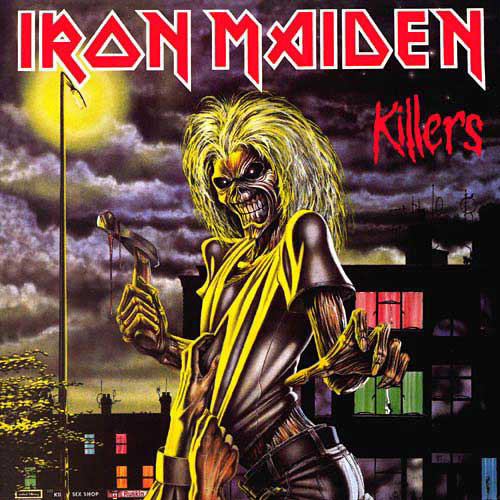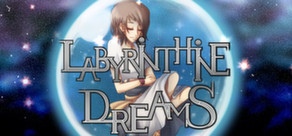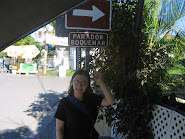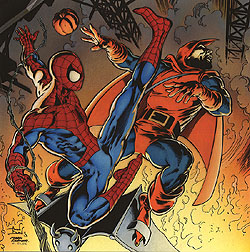
Killers (1981)
Longer and nastier than its predecessor, Iron Maiden's second album is an impressive demonstration of the style of metal the band helped create. They would evolve a great deal over the course of their career, and while the music would get much more complex and sophisticated, I don't think it ever got faster than some of the songs on Killers.
While Iron Maiden was something of a metal potpourri (there's a Jeopardy word for you) with little similarity between the individual songs, Killers is much more unified in both style and subject matter. As the name would suggest, the thematic element tying this album together is murder. Insane serial killers (the title track), punks plotting the demise of their enemies ("Wrathchild"), unfortunate saps who have been wrongly accused ("Murders in the Rue Morgue," "Innocent Exile"), victims communicating from beyond ("Twilight Zone"), scoundrels hoping to atone ("Prodigal Son," "Drifter"), it's all here.
Guitarist Dennis Straton left the band after the first album and was replaced by Adrian Smith. With him on the team, the entire ensemble is even stronger, though more changes would be on the way. Singer Paul Di'Anno, who contributes a lot of great vocals this time around, was kicked out of the band after his rampant cocaine and alcohol use began bringing down the band's live performances. The rest of the band avoided most of the drug-related pitfalls that plague musicians, and Di'Anno already had a reputation for troublemaking. He went on to a semi-successful solo career and is apparently still quite a scoundrel - he just recently completed a jail sentence for welfare fraud.
The album's first track is the instrumental "The Ides of March,", a very brief song that serves mostly as an epic intro to "Wrathchild." Though never released as a single, it remains the most consistently popular track off this album and it isn't hard to see why. Everything just works - Steve Harris's badass bass intro, Smith and Murray's screaming guitars, Di'Anno's growling, and Clive Burr's verstatile drumming. The brief drum solo in the middle is right up there with "In the Air Tonight" in terms of air-drumming potential.
"Murders in the Rue Morgue" has a slow intro that quickly revs up into a series of furious riffs that evoke a high-speed pursuit. Based on a short story by Edgar Allan Poe, the lyrics are unusually detailed as far as this early Maiden stuff goes. Our protagonist is on the run after being accused of two murders he didn't commit (or did he?)
So far so good, though things falter a bit with the next few tracks. I'm forever getting "Another Life" and "Innocent Exile" mixed up - both have scant but repetitive lyrics and long instrumental sections. Sandwiched between them is another instrumental track, "Genghis Khan," which does a decent job evoking the kind of epic battles associated with its namesake. That said, I'm not sure the album needed another track sans lyrics. Upon closer examination, "Another Life" is the weaker of the two songs. It's basically one verse repeated multiple times and there's very little that stands out musically either. "Innocent Exile" fares better, with a nice bass intro and some quality Di'Anno shrieks.
"Killers" is one of the best tracks on the album, which is evident from the stunning introduction. It leads off with another awesome bass intro by Harris (this album as a whole is a perfect demonstration of his skills) and a series of spooky yells from Di'Anno. Then it kicks into high-gear and doesn't stop until the very end. The drum part that starts at about 2:18 is jaw-droppingly fast. Lyrically, it's complex and interesting. The killer seems to be driven by some twisted moral motive and seems to have moments of guilt...but in the end, "his bloodlust defies all his needs."
"Prodigal Son" doesn't really do much for me. Normally, I'm a big fan of Maiden's ballads, but this one lacks the haunting qualities that made "Strange World" so great. It's not bad, but usually when I'm listening to this album in full, I find myself waiting for this one to be over.
 Then there's "Purgatory." Holy shit, "Purgatory." Iron Maiden crams more awesome riffs into this three and a half minute song than most bands do in entire albums. It careens forward at top speed, and Di'Anno sounds like he's having an absolute blast singing this one. It never fails to get me psyched up, but for whatever reason it's a consistently underrated song in the band's catalogue.
Then there's "Purgatory." Holy shit, "Purgatory." Iron Maiden crams more awesome riffs into this three and a half minute song than most bands do in entire albums. It careens forward at top speed, and Di'Anno sounds like he's having an absolute blast singing this one. It never fails to get me psyched up, but for whatever reason it's a consistently underrated song in the band's catalogue. Next is "Twilight Zone," a trim song with no connection to the television show of the same name. Given its 70s rock vibe, a better comparison might be to Golden Earring, who has a song with this same title. It's enjoyable, though I find it a little too short. You start getting into it and then it just ends.
The lyrics of "Drifter" make references to the idea of moving on and hoping for a better future, and I can't help thinking of Di'Anno's departure when I listen to it, though I don't think that was intentional. It's a pretty complex finale to the album, with a lot of tempo changes and some interesting solos.
____________________________________
Overall Strengths: The skills of all the musicians involved was already impressive on the last album and on this one they have only gotten better, especially Steve Harris's phenomenal bass. A very strong album with a unified theme and feel.
Overall Weaknesses: The songs can be a little too similar at times, particularly in the same-ey middle section.
Recommended Tracks
The Ides of March/Wrathchild
Murders in the Rue Morgue
Killers
Purgatory
Next: Bruce Dickinson arrives and the band changes metal forever with "The Number of the Beast."




No comments:
Post a Comment